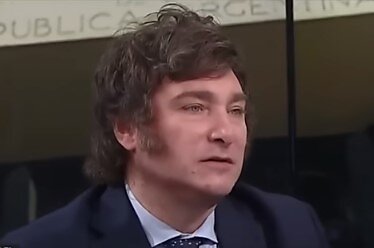On Sunday Javier Milei assumed the presidency of Argentina promising a radical change to the economic and social model that has ruined his country. His challenge is enormous, but the new president has made a politically astute start.
Unlike what Argentines have become accustomed to from their political leaders, in his inauguration speech Milei treated them as adults. He presented a clear vision. The collectivism into which Argentina long ago headed, he declared, has failed. “For more than 100 years, politicians have insisted on defending a model that only generates poverty, stagnation and misery,” he explained.
He said that it is necessary to return to what made Argentina one of the richest countries in the world more than a century ago: classical liberalism. He again repeated what he meant by using liberal thinker Alberto Benegas Lynch, Jr.’s definition: “Liberalism is the unrestricted respect for the life project of others based on the principle of non‐aggression and the defense of the right to life, liberty, and private property.” And he made clear that that is “the essence of the new social contract chosen by the Argentines.”
“This new social contract,” added Milei, “proposes a different country, a country in which the state does not direct our lives, but rather safeguards our rights.” In practice, he proposed nothing less than undoing the corporatist legacy of Peronism that has led the country from crisis to crisis and replacing it with institutions and policies that limit political power.
Milei was brutally honest about the difficulties facing the country. “I prefer to tell you an uncomfortable truth rather than a comfortable lie.” He described the legacy left by the outgoing government and that, as a result, economic activity, poverty, wages, and unemployment will get markedly worse before they get better. The fiscal deficit is around 15 percent of GDP; the monetary emission of the previous government will continue to create inflation for 18 to 24 months with the potential to reach up to 15,000 percent annually if things stay on the same path; the public debt has reached $100 billion; there is a lack of access to foreign markets; poverty afflicts 45 percent of the population and indigence 10 percent. The new president also described the calamitous conditions in which public security, education, and infrastructure find themselves.
For these and other reasons, it was not an exaggeration for the Argentine daily La Nación to declare that the outgoing president has been the worst in Argentine history. That is also why Milei explained there is no alternative to a strong adjustment: quite simply, “there is no money.” The priority will be fiscal adjustment and Argentines do not have the luxury to implement gradual reform.
Citing Argentine history, Milei showed that gradualism does not work. He could have cited the European post‐communist experience as well, as countries that reformed quickly and in a coherent manner grew at higher rates and achieved lower inflation, greater levels of foreign investment, and the development of stronger institutions.
Also unlike past experience, the coming adjustment, Milei clarified, will fall almost entirely on the state and not on the private sector. Cleaning up public accounts in such a way is consistent with the most successful international practices and with Milei’s liberal vision. As the former professor rightly insisted, “the only way out of poverty is with more freedom.”
In the days and weeks to come, we will have more details about how the new government proposes to get out of the hole in which the country finds itself. Just yesterday evening, the new finance minister announced a series of measures that intend to close the fiscal deficit by 5 percent in the coming year. They include cuts to energy and transportation subsidies, an end to new infrastructure spending, a devaluation of the official exchange rate of about 50 percent, and a reduction in federal transfers to the provinces among other measures that, by and large, point the country in the right direction. The economic pain will be deep.
There is no doubt that Milei will face political resistance from the Peronists and their allies, and that the challenge will be even greater given the new leader’s lack of a majority in Congress. But Milei has a popular mandate to bring about a paradigm shift and, as the crisis worsens, he is counting on the people to continue to understand who should be held responsible for Argentina’s mess.
Note: This article is based on a version that was originally published in El Comercio (Peru) on December 11, 2023.




